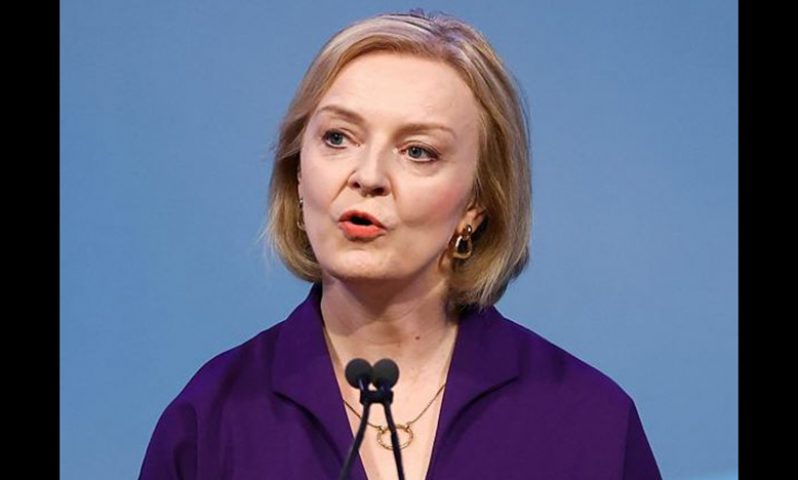Liz Truss has promised to deal with surging energy costs and to cut taxes, after she won the Tory leadership contest to become the next Prime Minister.
Part of her plan, set to be announced on Thursday, could allow energy suppliers to take out government-backed loans in order to subsidise bills.
Truss will succeed Boris Johnson after being formally appointed by the Queen at Balmoral Castle on Tuesday.
The 47-year-old, the UK’s third woman PM, will then announce her Cabinet.
In her victory speech, she promised a “bold” programme of tax cuts to grow the flagging economy and to prevent the UK tipping into recession.
She will take the reins of power on Tuesday, bringing Boris Johnson’s turbulent premiership to an end less than three years after the Conservatives’ resounding election victory in 2019.
Truss’s most pressing decision as premier will be how best to shield households and businesses from the soaring international price of energy.
Her team is understood to have been working on a support package for weeks, with an announcement pencilled in for Thursday.
Under their plans, the government would guarantee loans to energy firms, who would then use the money to freeze or lower customers’ bills.
The loans would be repaid from bills over the next 10-20 years.
Scottish Power, which proposed the idea of government-backed loans, has estimated that freezing bills for two years could cost nearly £100bn.
The new government is also expected to offer small businesses some support, although the BBC has been told details of the plan may not be included in Thursday’s announcement.
Speaking at the Queen Elizabeth II conference centre in London, Truss told party activists she would “deliver on the energy crisis” by dealing with bills and boosting the UK’s domestic energy sources.
Truss beat rival Rishi Sunak with 57 per cent of the vote, a narrower win than expected.
Those expected to be appointed to her top team include Kwasi Kwarteng as chancellor, former leadership rival Suella Braverman as home secretary and James Cleverly as foreign secretary.
Following Truss’s victory, the Home Secretary Priti Patel and Culture Secretary Nadine Dorries said they would be stepping down as senior ministers.
Johnson congratulated Truss on her victory and said she had the right plan to “unite our party”.
Truss paid tribute to her “friend” Johnson in her victory speech, adding he would be “admired from Kyiv to Carlisle” for his record in office.
“Boris, you got Brexit done, you crushed Jeremy Corbyn, you rolled out the vaccine and you stood up to Vladimir Putin,” she said.
In a break with tradition, the outgoing and incoming prime ministers are expected to travel to Balmoral Castle in Scotland for the handover of power, rather than Buckingham Palace.
The Queen has been suffering from mobility issues and it is understood the change was made to prevent the need for any last-minute rearrangements.
Truss has promised £30bn in tax cuts in an emergency Budget later this month, having blamed the tax burden for the UK’s sluggish growth.
Her proposed cuts include reversing the rise in National Insurance under Johnson’s tenure, temporarily ditching green levies on energy bills, and scrapping a planned rise to corporation tax.
As well as the domestic agenda, her in-tray also includes continuing to support Ukraine after its invasion by Russia and repairing a fractious relationship with the EU over Northern Ireland.
Former chancellor Rishi Sunak, who attacked her economic plans during the campaign, told the BBC he would offer her his “full support”.
He said he will stand again to be an MP at the next general election, but is not expected to be in Truss’s Cabinet.
Labour has called on Truss to expand the windfall tax on the profits of oil and gas companies to part-fund a six month freeze to domestic prices.
The party followed the Liberal Democrats earlier this summer in backing a freeze, along with the SNP.
Truss, however, has ruled out further windfall taxes, saying during the campaign it “sends the wrong message to international investors”.
Speaking earlier, Labour leader Sir Keir Starmer pledged to work with Truss to deliver a freeze, saying there was cross-party agreement on the idea.
He criticised her approach on the economy, arguing she had talked more in her campaign about cutting taxes for businesses than the cost of living crisis.
“That shows that not only is she out of touch, but that she’s not on the side of working people,” he added.
Lib Dem leader Sir Ed Davey told BBC News Truss “appears to have no plan whatsoever” to deal with rising prices and the Tories were responsible for “lamentable” economic growth.
SNP leader and Scottish first minister Nicola Sturgeon called for the price freeze to include businesses, which are not normally covered by the UK’s energy price cap, and extra cash support. (BBC)












